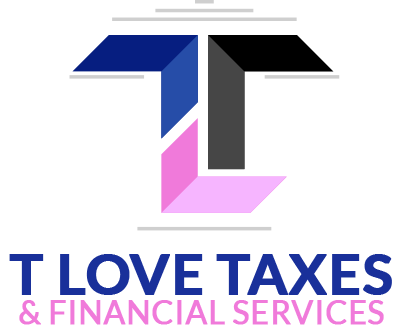When it comes to starting a business in Indiana, one of the first steps is choosing the right entity type. Each structure comes with its own set of tax implications, and the wrong choice could impact your financial health down the line. This guide explores each entity type, their tax obligations, and tips for effective tax planning.
Introduction: Understanding Business Entities
Starting a business in Indiana offers several options for entity structure, each with its own benefits and tax requirements. Choosing the right entity not only determines your personal liability but also how much you’ll pay in taxes, what forms you need to file, and your eligibility for certain deductions. T Love Tax and Financial Services is here to help Indiana entrepreneurs understand these options, making sure you’re prepared for tax season while strategically planning for business growth.
Sole Proprietorship
A sole proprietorship is the most straightforward business structure. It’s a good choice for freelancers, consultants, and solo entrepreneurs who don’t expect to take on significant risk.
- Tax Implications: All income is reported on the owner’s personal income tax return, using IRS Form 1040 and Schedule C. Self-employment taxes apply, covering Social Security and Medicare.
- Pros: Minimal paperwork, no special legal setup, and easy to maintain.
- Cons: The owner is personally liable for all debts and obligations, which can put personal assets at risk.
This setup keeps accounting simple but requires careful planning to ensure taxes are managed correctly.
Partnerships
Partnerships in Indiana are best for businesses with two or more owners. Partnerships come in different forms, impacting taxation and liability.
General Partnership
In a general partnership, partners share profits, losses, and liabilities equally.
- Tax Implications: Income “passes through” to partners, each reporting their share on personal tax returns. A partnership file is required with IRS Form 1065.
- Pros: Easier to set up than corporations, allows flexibility in decision-making.
- Cons: All partners share responsibility for business liabilities.
Limited Partnership
A limited partnership (LP) includes both general partners (who manage the business) and limited partners (who invest but have limited involvement).
- Tax Implications: Similar to general partnerships, income passes through to partners. However, limited partners typically only report investment income.
- Pros: Liability is limited for certain partners, allowing investors to participate with less risk.
- Cons: Requires more formal paperwork and filings in Indiana, including a partnership agreement.
Limited Liability Company (LLC)
A Limited Liability Company (LLC) offers flexibility, combining elements of corporations and partnerships. LLC owners (or “members”) have limited liability but enjoy the tax benefits of a partnership.
- Tax Implications: Income passes through to members, avoiding corporate income taxes. Indiana LLCs can elect to be taxed as a corporation if beneficial.
- Pros: Personal liability is limited to the amount invested in the LLC. Profits are only taxed once, and filing is often less complex than a corporation.
- Cons: Indiana requires annual report fees, and LLCs can have more complex operational structures.
LLCs are popular in Indiana due to this blend of flexibility and protection, making them suitable for small to medium businesses.
Corporations
Corporations are separate legal entities from their owners, offering the highest level of liability protection but also requiring more formalities.
C Corporation
A C Corporation is the standard corporate structure and is taxed independently from its owners.
- Tax Implications: C Corporations are subject to “double taxation,” where profits are taxed at the corporate level and again as personal income when dividends are distributed.
- Pros: Limited liability for shareholders, greater potential for raising capital.
- Cons: Requires regular filings, meeting minutes, and strict formalities.
S Corporation
An S Corporation avoids double taxation by allowing income to pass through to shareholders, similar to an LLC or partnership.
- Tax Implications: Income passes through to shareholders and is reported on personal tax returns, avoiding corporate tax. However, all owners must be U.S. citizens.
- Pros: Provides the liability protection of a corporation while being tax-efficient.
- Cons: Limited to 100 shareholders, restricting investment options.
Both types of corporations are suitable for larger Indiana businesses seeking significant growth and investment.
Nonprofit Organizations
Nonprofits are established for charitable, educational, or other purposes that benefit the public, rather than generating profit.
- Tax Implications: Qualifying nonprofits are exempt from federal income tax, and donors may receive tax deductions for contributions.
- Pros: Tax-exempt status, access to grants, and potential for tax-deductible donations.
- Cons: Limited in terms of profit use, requiring strict adherence to purpose and reporting.
Nonprofits are ideal for Indiana entrepreneurs aiming to make a community impact while benefiting from tax exemptions.
Cooperatives
A cooperative (or “co-op”) is a business owned and operated by its members for their mutual benefit.
- Tax Implications: Income is typically only taxed at the member level. Co-ops may also benefit from specific tax deductions.
- Pros: Shared risk and reward, tax benefits for members.
- Cons: Often less capital than other structures and limited growth potential.
Cooperatives work best for groups looking to pool resources and share in profits and decision-making.
Choosing the Right Entity for Your Business
Choosing the right entity in Indiana boils down to your business goals, risk tolerance, and tax needs. A small business owner may find an LLC ideal, while a growing tech firm might prefer a corporation. T Love Tax and Financial Services can guide you in evaluating these factors to determine the best structure for your unique situation.
Tax Deductions for Business Expenses
Every business entity can benefit from understanding tax deductions for business expenses. From office supplies to vehicle expenses, deductions can reduce your taxable income.
- Examples: Home office expenses, business travel, meals, and equipment costs.
- Benefit: Reduces the amount of taxable income, saving money.
Explore more about deductions and credits on our Tax and Financial Services page.
Accounting and Bookkeeping for Small Businesses
Staying on top of your finances is key for Indiana businesses. Proper accounting and bookkeeping ensure you’re prepared for tax season and aware of cash flow.
- Services: Regular income and expense tracking, financial reports, tax preparation.
- Tools: Software like QuickBooks and Xero helps streamline accounting for small businesses.
T Love Tax and Financial Services provides Tax and Financial Services in Indiana to simplify your accounting.
Payroll and Employment Taxes
Payroll is more than just paying employees; it involves withholding taxes, filing reports, and staying compliant with Indiana tax laws.
- Components: Federal and state income tax, FICA taxes, unemployment insurance.
- Compliance: Accurate payroll prevents penalties and ensures employee satisfaction.
Tax Strategies for Business Growth
A solid tax strategy supports long-term growth by maximizing deductions, credits, and deferrals.
- Strategies: Deferred revenue, retirement contributions, asset depreciation.
- Goal: Lower taxable income to support reinvestment in the business.
Learn about effective strategies at T Love Tax and Financial Services.
Working with T Love Tax and Financial Services
Navigating Indiana’s tax landscape can be overwhelming. T Love Tax and Financial Services offers guidance, helping businesses select the right structure and maximize deductions.
Final Thoughts
Understanding your options for business structure and tax obligations in Indiana can seem complex, but the right choice makes a big difference. Working with an experienced partner like T Love Tax and Financial Services ensures you’re on the right path, equipped with the knowledge to grow effectively.
FAQs
- What is the best business structure for tax savings? LLCs and S Corporations often provide the best tax savings due to pass-through taxation.
- Are nonprofits always tax-exempt? Only qualifying nonprofits registered with the IRS can receive tax-exempt status.
- How does double taxation work for C Corporations? C Corporations pay corporate taxes, and shareholders pay personal taxes on dividends.
- Can Indiana partnerships deduct business expenses? Yes, partnerships can deduct ordinary business expenses, reducing taxable income.
- What are payroll taxes? Payroll taxes include income tax withholding, FICA, and unemployment taxes, necessary for all employers.

